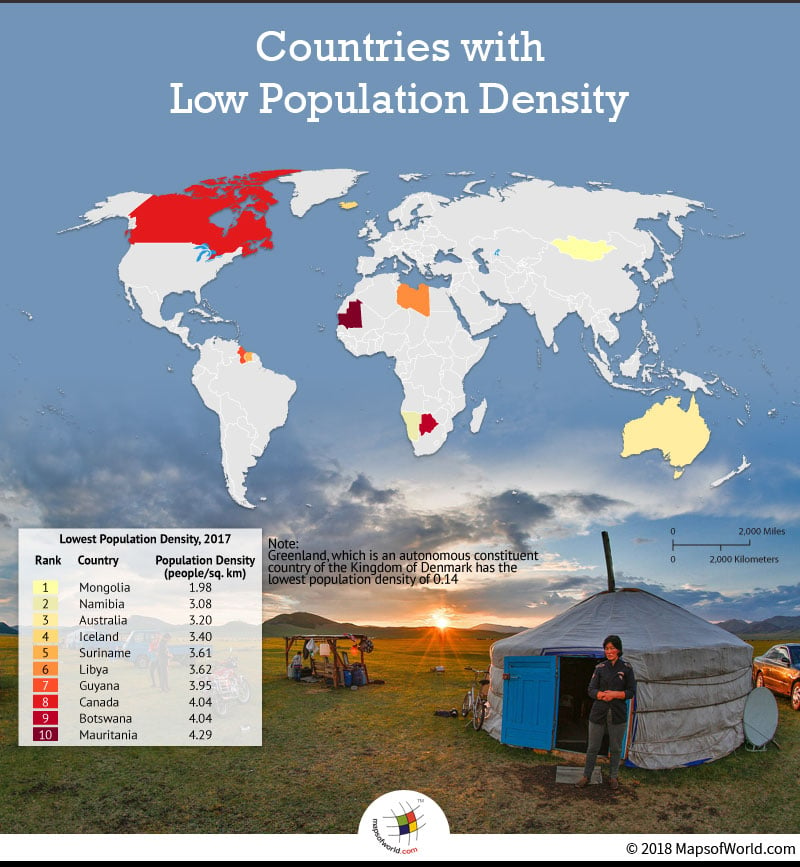What Countries have Low Population Density?

Despite the increasing population around the world, there are a few countries which have maintained a low population density. There are different reasons, for each of the nations. Let us dive into the reasons. after a quick glance at the ten countries which are least crowded.
| Country Name | 2017 Population Density |
|---|---|
| Greenland | 0.14 |
| Mongolia | 1.98 |
| Namibia | 3.08 |
| Australia | 3.20 |
| Iceland | 3.40 |
| Suriname | 3.61 |
| Libya | 3.62 |
| Guyana | 3.95 |
| Canada | 4.04 |
| Botswana | 4.04 |
Reason Behind Low Population Density
There are several reasons behind the low population density of Mongolia. First of all, the terrain is quite inhospitable, the majority of the people live nomadic lives and the birth rate in the country is not a great one. Just like Mongolia, Namibia too has a desert and the birth rate over here is not that high as well. In case of Australia the major reason for the low population density is the huge Great Australian Desert on the western part of the country. The grasslands in the Australia also receive very little rain making it hard for people to settle over there.
The situation is a bit different in Suriname where the geographic conditions are pretty good enough. Here economy is the main reason. There are not too many cities where people can find work and this is why perhaps a lot of people migrate to European countries such as The Netherlands, which was a former colonial master of this Caribbean country. One of the major reasons behind the low population density in Iceland is the lack of immigration. In fact, more people have gone out of the country in recent times than the number of people who have come in. Thanks to frequent volcanic eruptions some places cannot be inhabited at all. In case of Mauritania the majority of the country is a desert, which is why it is so sparsely populated. A significant part of Canada, up north especially, is part of the Arctic Circle and the conditions here do not encourage abundant human population. This is one reason behind the low population density of Canada.
While there are no specifically-clear reasons as such for the low population density in Guyana it may be assumed that migration constitutes one of the major reasons. It has also had a history of racial conflict between African origin people and their Indian counterparts. In case of Botswana perhaps the major reason behind the low population is the desert terrain that makes large swathes of land incapable of sustainable in-habitation
. Libya has a low population rate primarily because of its inhospitable desert terrain and present economic issues.
Benefits and Disadvantages of Living in Such Countries
As there are always two sides to a coin, living in a country with low population density comes with its advantages and disadvantages.
From a social point of view there is never overcrowding at any place. Since in most of the places the communities are smaller there is great cohesion among the people. When looked at from an economic point of view it is always easier to manage the finances and resources in these countries. There is less wastage of natural resources, which makes things easier for all. One only needs to take a look at the example of countries such as Australia and Canada to see how well the government has been able to manage resources – both natural and financial – and bring about wide-ranging development. In fact, Botswana has been doing well of late and Iceland too has been steady from an economic point of view. These countries also often have low crime rates, which is a marker of a country on the right track.
However, in some cases – as in the instance of countries such as Mongolia, Namibia, Suriname, Libya, Mauritania, and Guyana – the economy of these countries suffers from lack of sufficient workforce. There are not too many people to work and earn and thus boost the national economy. A low population density also reveals that the terrain is inhospitable in most parts and thus activities like agriculture and industries may not be possible over there. These countries also suffer from unequal economic development since most people are living in a few cities that keep doing well while others languish in the background.
Know More:
